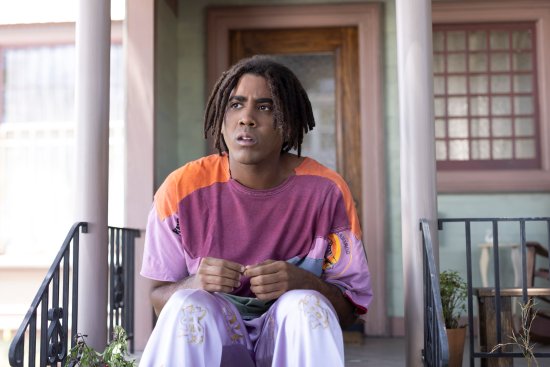
A century after the Paul Bunyan legend’s heyday, the U.S. is no longer on the rise. So it’s fitting that 'Sorry to Bother You' director Boots Riley has created a new supersized folk hero for our tumultuous times.
Within the pantheon of American folk heroes, no figure walks taller than Paul Bunyan. A giant lumberjack accompanied by a blue ox named Babe, he’s often credited with carving the Grand Canyon and spilling the trail of water that would become the Mississippi River. Tall tales aside, he literally towers over our national landscape in the form of flannel-clad roadside statues scattered from coast to coast—monuments to the rugged workingmen of an ascendant nation.
A century after the Bunyan legend’s heyday, the United States is, to say the least, no longer on the rise. So it’s fitting that Boots Riley, the veteran rapper and activist who pivoted to the screen with 2018’s surreal anti-capitalist satire Sorry to Bother You, has created a new supersized folk hero for our tumultuous times. The protagonist of his equally offbeat—and even more daringly radical—dark comedy I’m a Virgo, which premieres June 23 on Amazon, is a 13-foot-tall Black teenager named Cootie, portrayed with gentle-giant naïveté by When They See Us standout Jharrel Jerome. And instead of roaming free across the country, he spends his first 19 years under unofficial house arrest.
[time-brightcove not-tgx=”true”]
Anti-Establishment types living in Oakland, Cootie’s aunt and uncle (Carmen Ejogo and Mike Epps) keep him hidden away because they fear what society might do to such a conspicuous embodiment of Black power. They promise to let him out at 21, but teens will be teens; he starts sneaking out. A world of new friends, new foods, and new socio-political struggle awaits. Primed by the radical theory that has suffused his homeschool curriculum, Cootie bonds with a young communist organizer, Jones (Kara Young), and falls for Flora (Olivia Washington), who works at fast-food chain Bing Bang Burger and has extraordinary abilities of her own.
But his guardians were right to worry about him. Despite his education, Cootie treasures the parasocial relationships he’s formed with TV personalities and the superheroes in the comic books he reads religiously; for years, they were the only friends he had. His idol is comics mogul Jay Whittle (Walton Goggins), who patrols the streets as his character The Hero, a sort of aerial, vigilante Robocop whose fanaticism for the rule of law makes him very dangerous to people like Cootie’s many neighbors eking out an existence in the underground economy. If Cootie is to survive—and fulfill the potential inherent in his biology—he has to learn who his real allies are.

“All art is propaganda,” Jay opines. Virgo and Sorry suggest Riley would agree on that particular point. A self-described communist—though not in the authoritarian sense with which most Americans associate the term—he uses Jones as a mouthpiece for disquisitions on direct democracy, privatized healthcare, and capitalism’s incentive to keep unemployment rates high.
Such speechifying will be a dealbreaker for some viewers, whether because they’re scandalized by Riley’s politics or because they hate lectures. I’m usually put off by preaching, too, but at least Virgo’s constitutes a departure from the bland liberalism that’s so common in an era when so much TV is essentially a series-length Very Special Episode. For one thing, it’s tempered by genuine, if often bleak, hilarity; Cootie’s pal Scat (Allius Barnes) obsesses over a cult cartoon whose sunny visuals belie morbid themes, and the giant’s awkward first sexual encounter with Flora balances raunch with tenderness. The show also respects its audience’s intelligence, presenting ideas that might be unfamiliar without either condescending or feigning ideological neutrality.
The fact that Riley has chosen Amazon’s Prime Video as a base to wage war on capitalism (not to mention the weirdo billionaires he savagely satirizes) is sure to strike some as incongruous, if not fully hypocritical. Then again, what one person perceives as selling out might look like seizing the means of production to another. If you’re going to use one of the world’s most lucrative corporations as your soapbox, it pays to craft a critique as colossal as a 13-foot man.